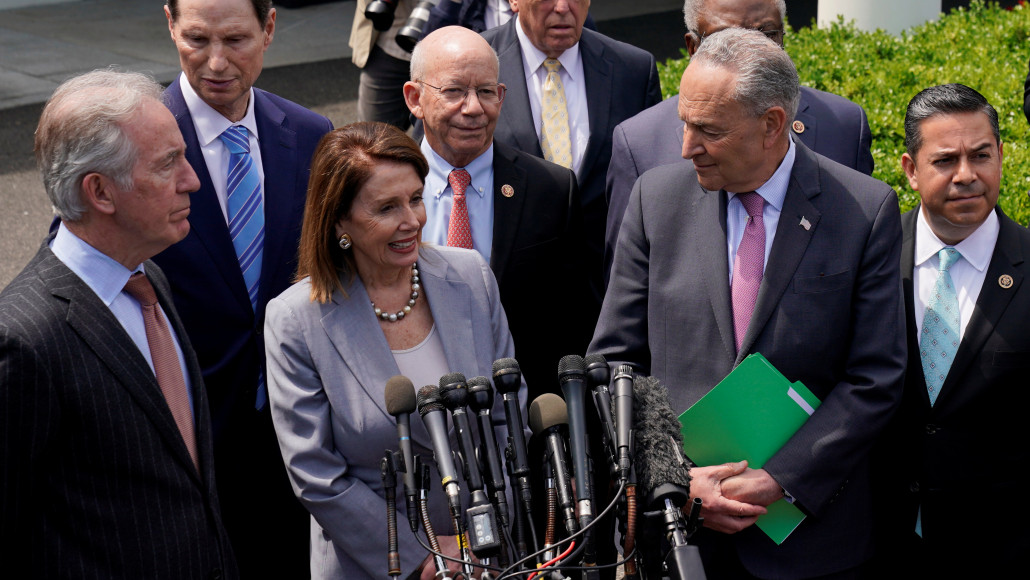The $2-trillion for infrastructure plan announced Tuesday by President Trump and leading Democrats represents an enormous boost in transportation spending that couldset the U.S. on a path to fossil fuel independence, but will more likely lock some of our unsustainable patterns into place for a generation.
The details are still sketchy, making it hard to say how transit, biking and walking will fare in an actual bill. And at least for now, Democratic leaders, are saying the right things.
House Speaker Nancy Pelosi (D-Calif.) and Senate Minority Leader Schumer (D-N.Y.) have told Trumpthat sustainability, health and safety should be part of any infrastructure bill — and it should "advance public health with clean air and water and make our transportation system safer [and] improve the quality of life of all Americans."
They also told Trump that "a big, bold infrastructure" plan "must be comprehensive and include clean energy and resiliency priorities."
But it's unclear how hard they'll push — or what they even mean. The Democratic leadership is under pressure from the Left and the Right on issues of environmental responsibility. Insurgent Democrats have pushed the "Green New Deal," which calls for completely transforming America's transportation systems, agriculture and buildings away from fossil fuels — a proposal that Pelosi has kept at arm's length.
That's probably because, the GOP leadership has sought to tie its Democratic counterparts to the left flank, with Senate Majority Leader Mitch McConnell trying to force a vote on the Green New Deal in March, and climate-change-denying Sen. James Inofe (R-Okla.) signaling the party's strategy by calling the Green New Deal "the gift that keeps on giving" because it forces Democrats to either take what the GOP considers an unpopular standfor the environment or to cave to the GOP-pushed notion that working to prevent catastrophic climate change would cause too much harm to the economy.
But neither GOP position is correct. The Green New Deal, though still a vague proposal, is popular, polls show. And other studies show that reducing America's dependence on fossil fuels need not hurt the economy.
Still, the GOP rank-and-file loves putting Democrats in a classic political bind: They're the party of higher taxes — taxes that they'll just waste on things we can't afford, like saving the planet from an existential climate threat that real Americans know isn't happening: “The Democrats want Trump to endorse higher taxes so Democrats could, once again, spend on everything except roads," Grover Norquist, the president of Americans for Tax Reform, told The Daily Caller.
That could be why Pelosi couched her talk of environmental responsibility on Tuesday without mentioning the Green New Deal. In a press conferencefollowing the White House meeting, she said the infrastructure bill could help with "getting people out of their cars, not being on the road so much.” But she may have just been referring to addressing congestion, in other words, wider highways.
That's a big concern because a huge round of infrastructure spending could very well unleash a deluge of highway projects that fuel urban sprawl. That would impose land use patterns that practically guarantee millions more Americans would need to rely on cars for every trip — at a time when the planet is facing an existential sustainability crisis.
And despite GOP railing, there really isn't any indication Democrats would draw a hard a line against new highway construction. House Transportation and Infrastructure Committee Chairman Peter DeFazio (D-Ore.) specifically mentioned roads and bridges — even before transit systems — in his statementabout the White House meeting. Lawmakers were busy talking about a variety of issues from aviation to harbor in a Committee Members hearing on Wednesday. One of the more progressive members, Earl Blumenuer (D-Ore.) testified on the need to support complete streets to help realize the goal of zero traffic deaths, among other things. The rest of the testimony was pretty boilerplate.
When Streetsblog interviewed DeFazio recently about his goals, he said he hoped to get a moderate boost in funding for biking and walking and a build a network of electric vehicle charging stations. But he said he did not expect the federal funding formula — which dedicates 80 percent of surface transportation funds to highways and 20 percent to transit — to change. (The Green New Deal would almost certainly require a shift in that long-fixed formula.)
Without major changes in the federal infrastructure funding formulas, a major infrastructure stimulus would almost certainly result in a lot of highway building. And there isn't very much in the way of bold proposals from Democrats, beyond the 92 Democrat members of Congressand 12 Senatorswho have already signed onto the Green New Deal (Pelosi and Schumer, tellingly, are not on the list). There haven't been any calls, from leading Democratic officials, for connecting millions of new households by sidewalk, or cities by high-speed rail — the types of bold innovative investments that could really wean American transport off fossil fuels.






